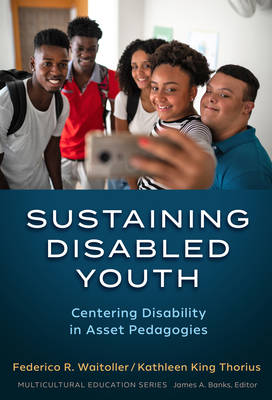
- Retrait gratuit dans votre magasin Club
- 7.000.000 titres dans notre catalogue
- Payer en toute sécurité
- Toujours un magasin près de chez vous
- Retrait gratuit dans votre magasin Club
- 7.000.0000 titres dans notre catalogue
- Payer en toute sécurité
- Toujours un magasin près de chez vous
Sustaining Disabled Youth
Centering Disability in Asset Pedagogies
Description
Asset-based pedagogies, such as culturally relevant/sustaining teaching, are frequently used to improve the educational experiences of students of color and to challenge the white curriculum that has historically informed school practices. Yet asset-based pedagogies have evaded important aspects of students' culture and identity: those related to disability.
Sustaining Disabled Youth is the first book to address this deficit. It brings together a collection of work that situates disability as a key aspect of children and youth's cultural identity construction. It explores how disability intersects with other markers of difference to create unique cultural repertoires to be valued, sustained, and utilized for learning. Readers will hear from prominent and emerging scholars and activists in disability studies who engage with the following questions: Can disability be considered an identity and culture in the same ways that race and ethnicity are? How can disability be incorporated to develop and sustain asset-based pedagogies that attend to intersecting forms of marginalization? How can disability serve in inquiries on the use of asset-based pedagogies? Do all disability identities and embodiments merit sustaining? How can disability justice be incorporated into other efforts toward social justice?
Book Features:
- ● Provides critical insights to bring disability in conversation with asset-based pedagogies.
- ● Highlights contributions of both university scholars and community activists.
- ● Includes analytical and practical tools for researchers, classroom teachers, and school administrators.
- ● Offers important recommendations for teacher education programs.
Spécifications
Parties prenantes
- Editeur:
Contenu
- Nombre de pages :
- 264
- Langue:
- Anglais
- Collection :
Caractéristiques
- EAN:
- 9780807767696
- Date de parution :
- 25-11-22
- Format:
- Livre relié
- Format numérique:
- Genaaid
- Dimensions :
- 162 mm x 235 mm
- Poids :
- 523 g

Les avis
Nous publions uniquement les avis qui respectent les conditions requises. Consultez nos conditions pour les avis.





